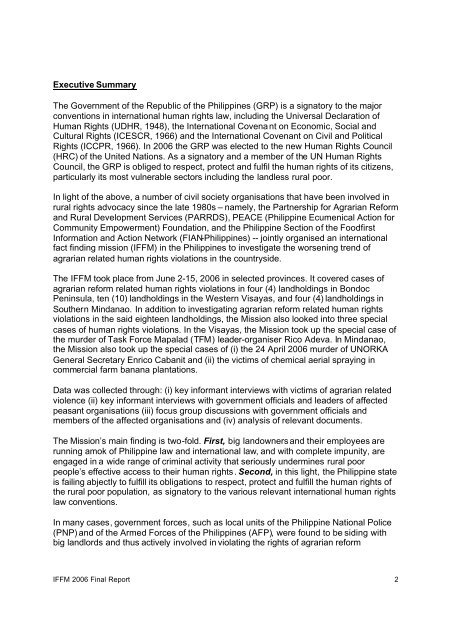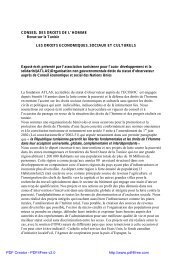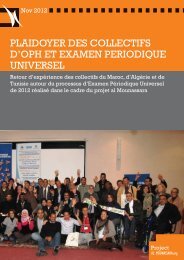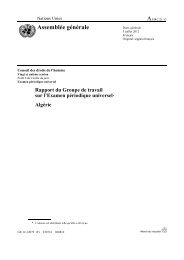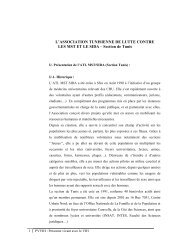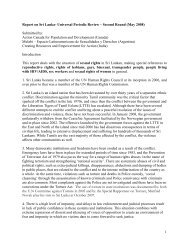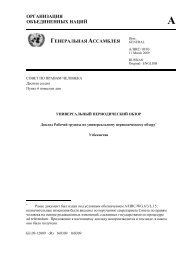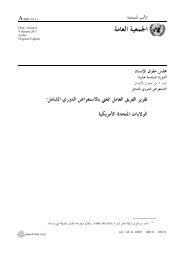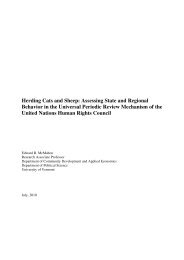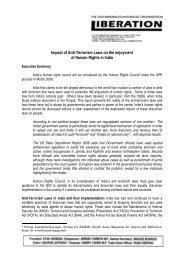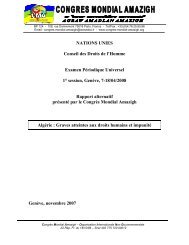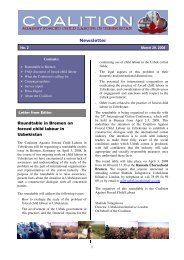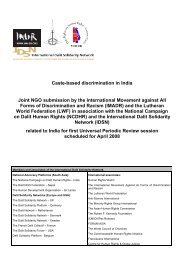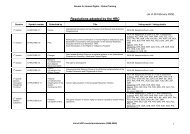1 - Universal Periodic Review
1 - Universal Periodic Review
1 - Universal Periodic Review
You also want an ePaper? Increase the reach of your titles
YUMPU automatically turns print PDFs into web optimized ePapers that Google loves.
Executive SummaryThe Government of the Republic of the Philippines (GRP) is a signatory to the majorconventions in international human rights law, including the <strong>Universal</strong> Declaration ofHuman Rights (UDHR, 1948), the International Covenant on Economic, Social andCultural Rights (ICESCR, 1966) and the International Covenant on Civil and PoliticalRights (ICCPR, 1966). In 2006 the GRP was elected to the new Human Rights Council(HRC) of the United Nations. As a signatory and a member of the UN Human RightsCouncil, the GRP is obliged to respect, protect and fulfil the human rights of its citizens,particularly its most vulnerable sectors including the landless rural poor.In light of the above, a number of civil society organisations that have been involved inrural rights advocacy since the late 1980s – namely, the Partnership for Agrarian Reformand Rural Development Services (PARRDS), PEACE (Philippine Ecumenical Action forCommunity Empowerment) Foundation, and the Philippine Section of the FoodfirstInformation and Action Network (FIAN-Philippines) -- jointly organised an internationalfact finding mission (IFFM) in the Philippines to investigate the worsening trend ofagrarian related human rights violations in the countryside.The IFFM took place from June 2-15, 2006 in selected provinces. It covered cases ofagrarian reform related human rights violations in four (4) landholdings in BondocPeninsula, ten (10) landholdings in the Western Visayas, and four (4) landholdings inSouthern Mindanao. In addition to investigating agrarian reform related human rightsviolations in the said eighteen landholdings, the Mission also looked into three specialcases of human rights violations. In the Visayas, the Mission took up the special case ofthe murder of Task Force Mapalad (TFM) leader-organiser Rico Adeva. In Mindanao,the Mission also took up the special cases of (i) the 24 April 2006 murder of UNORKAGeneral Secretary Enrico Cabanit and (ii) the victims of chemical aerial spraying incommercial farm banana plantations.Data was collected through: (i) key informant interviews with victims of agrarian relatedviolence (ii) key informant interviews with government officials and leaders of affectedpeasant organisations (iii) focus group discussions with government officials andmembers of the affected organisations and (iv) analysis of relevant documents.The Mission’s main finding is two-fold. First, big landowners and their employees arerunning amok of Philippine law and international law, and with complete impunity, areengaged in a wide range of criminal activity that seriously undermines rural poorpeople’s effective access to their human rights. Second, in this light, the Philippine stateis failing abjectly to fulfill its obligations to respect, protect and fulfill the human rights ofthe rural poor population, as signatory to the various relevant international human rightslaw conventions.In many cases, government forces, such as local units of the Philippine National Police(PNP) and of the Armed Forces of the Philippines (AFP), were found to be siding withbig landlords and thus actively involved in violating the rights of agrarian reformIFFM 2006 Final Report 2


